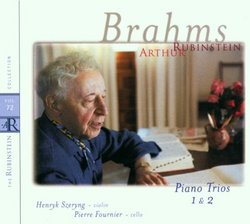| All Artists: Johannes Brahms, Artur Rubinstein Title: Rubinstein Collection, Vol. 72 Members Wishing: 0 Total Copies: 0 Label: RCA Release Date: 3/6/2001 Album Type: Box set, Original recording remastered Genre: Classical Styles: Chamber Music, Historical Periods, Classical (c.1770-1830), Modern, 20th, & 21st Century Number of Discs: 1 SwapaCD Credits: 1 UPC: 090266307227 |
Search - Johannes Brahms, Artur Rubinstein :: Rubinstein Collection, Vol. 72
 | Johannes Brahms, Artur Rubinstein Rubinstein Collection, Vol. 72 Genre: Classical
|
Larger Image |
CD Details |
CD ReviewsOutstanding Musicianship and Music Johann S de Bono | London UK | 07/13/2004 (5 out of 5 stars) "This music is heavenly. I have other versions of this music but this CD has blown me away. Highly recommended. The remastering is perfect." Aristocratic and gorgeous Jeffrey Jones | Northern California, USA | 07/22/2006 (5 out of 5 stars) "I had an opportunity last month to perform the B major trio at the piano with a collegiate cellist and an ex-professional violinist, so I decided as part of my preparation I would listen to a recording. This is the one I chose. My first impressions were that it was beautiful but flawed; the more I listened to it, though, the more I appreciated the beautiful and heartfelt performances that these musicians, all renowned in their own right, managed to produce in 3 days of collaborative effort. The quality that I disliked initially was that the ensemble (that is, the simple mechanical details of musicians playing together) came up a little bit short. Articulations don't always match. Fournier both rushes and drags the main theme of the 4th movement within one phrase (forcing the pianist to compensate, not that his part is difficult here), while Szeryng plays it straight to better effect. Rubinstein scrambles some of the triplets in the development section of the 1st movement, and there are some other places where he trips on the (very demanding) score. But to delve into these quibbles is to miss the positive qualities. The players balance each other expertly; in the same passage that Fournier scrambles rhythmically at the beginning of the fourth movement, he also makes the great decision to play so close to the bridge that it almost scratches -- this to give his big, burly instrument a more incisive kind of sound, which is naturally matched by the violin in the range it plays in afterwards. More attention to detail in the opening of the first movement, where the 'piu forte' is marked with a -very- prominent low F-sharp from the 'cello, which serves to make the piano sound both warmer and bolder. Or in certain spots of the finale, when Szeryng arches up to high notes and then slices into them, producing a heart-rending human wail. These very subtle details are remarkable in how economically, but effectively, they heighten the emotional impact of the music. So far I have only covered the B major trio; the C major trio is a very different animal, more difficult technically for the performers but less problematic emotionally. Rubinstein et al. perform it with simplicity and restraint, but still generate the right kind of warmth, expansiveness, and lyrical sweep that makes Brahms distinct from his illustrious predecessors. The variation movement, which has foreshadowings of the late piano music from Opp. 116-119, shows Rubinstein's touch for Brahms at its very, very best." That's fine LUPESCU SILVIU | ROMANIA | 10/31/2006 (5 out of 5 stars) "The Rubinstein's chamber music records are fascinating, Brahms with Guarneri more especially. I love the Trio Nr 1 recorded with Heifetz and Feurmann, but this recordings with Szeryng and Fournier are my favorite."
|

 Track Listings (8) - Disc #1
Track Listings (8) - Disc #1